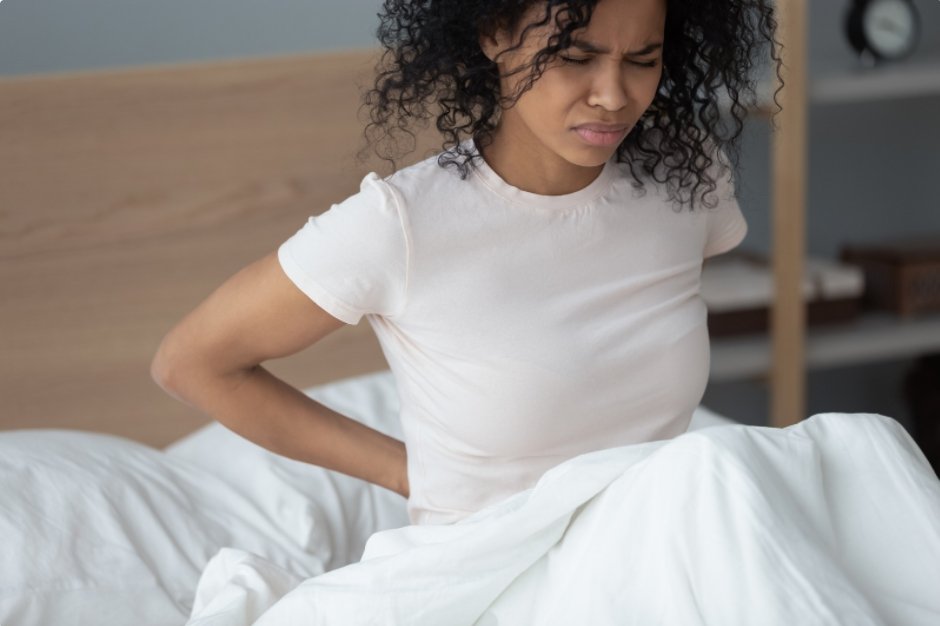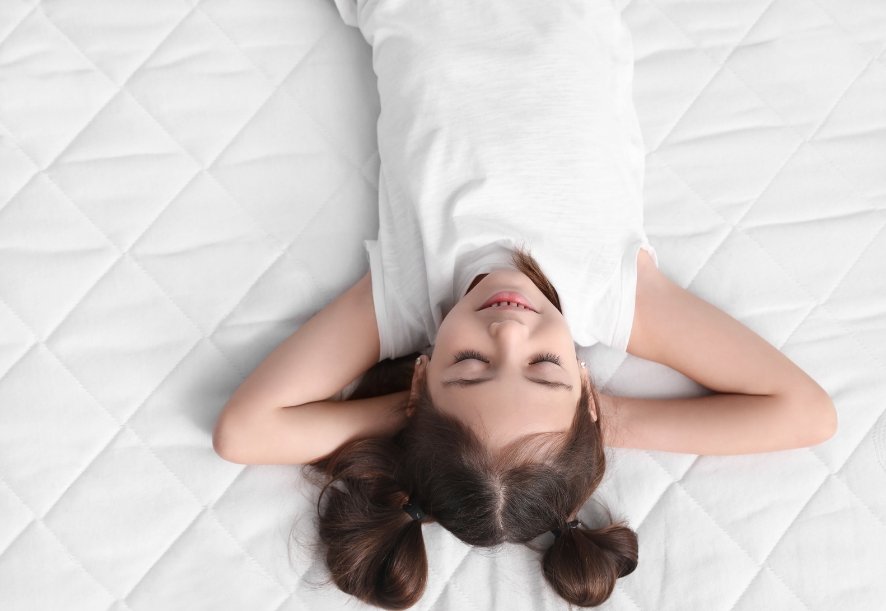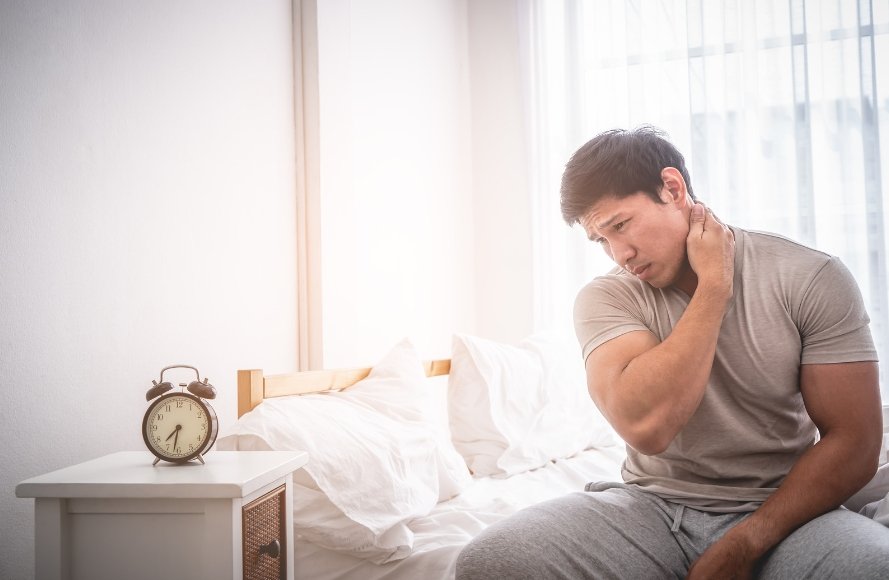How To Sleep Better If You Have Back Pain

How To Sleep Better If You Have Back Pain
If you struggle with lower back pain, then chances are that even the slightest shift in your mattress or pillow can be a huge disruption to your sleep. The good news is that there are some simple changes you can make to help improve how well you sleep, and they don't have to involve shelling out for an expensive new bed.
In this post we'll go over some of the most common causes of back pain as well as what you can do about them so that you can get a better night's rest.
Different Types Of Lower Back Pain
There are two types of back pain that you may experience, acute or chronic pain:
Acute lower back pain
Acute lower back pain is short-term, lasting for just a few days up to a few weeks. It often occurs along with an identifiable event or injury and typically goes away after the cause has been resolved if it was connected in some way such as by treating the underlying problem at its source.
Mild Lumbar Spinal Stenosis can have more long term effects on your mobility depending on how severe you are affected.
Chronic lower back pain
Chronic lower back pain can last for three months or longer. In many cases, it occurs without a clear link to an initial injury but there are some other factors that may have caused this persistent discomfort such as misaligned bones and muscles tension from poor posture habits over time which all lead up into debilitating chronic conditions like sciatica nerve damage.
How Is Sleep And Back Pain Connected?
A recent study found that lower back pain is linked to sleeping at night in a two-way street. Not only can it be caused by poor posture while sleeping, but people with chronic or acute low-back disorder may also have difficulty getting comfortable due their muscle spasms and tenderness from inflammation as well as other factors such as drastic weather disruption (thunderstorms, heavy wind, etc) during sleep, which causes vibrations felt throughout the entire body; this eventually leads you becoming more exhausted because your brain sends out less signals for energy production (which relies heavily on REM cycles).
Researchers have long seen an association between reduced functioning and increased chances of experiencing nighttime discomfort--and growing evidence points towards these problems mutually reinforcing each other over time."
Pain can be a major barrier to sleep. When the body is in pain, it's hard for you or your partner to get comfortable enough so that even if they manage fall asleep at some point during the night which doesn't happen often with lower back pain- their mind won't allow them deep rest because of all these terrible pains shooting through out again just waking up!
Do Sleep Positions Affect Back Pain?
There are many reasons why sleeping position can cause lower back pain. One of the most common causes is when you sleep with your spine in an unnatural alignment, such as during a twist or contortion that puts pressure on it without allowing for proper relief from gravity's tugging force.
The morning stiffness typically goes away after getting up but may return throughout the day if this continues over time- so make sure not to keep adding new positions! A person's spine will be at its most vulnerable when they are laying down, so it is important not to twist your body or place pressure on any area of the lumbar region if you don't want to experience discomfort throughout the day.
Can A Mattress Be A Cause of Back Pain?
A mattress can very well be a factor for causing back pain. The proper spinal alignment demands a medium-firm bed with no sagging, and research supports using this type of surface to help combat such pains but each person has their own preferences for how firm they like it so it’s best you find one out that suits your needs perfectly!
What Is The Best Sleep Position For Alleviating Back Pain?
The best sleeping position for lower back pain is on your side with a partial bend in the knees. Keeping the knees bent helps balance and reduces pressure on lumbar spines of people who have this issue, so it's worth trying! People also find that they get more comfortable by putting pillows between their legs or sitting up straighter while laying down to make sure there isn't any excess weight from being flat against something hard all night long.
Back sleepers can place a pillow under their knees, legs and lower back to support the natural curve of the spine. Stomach-sleepers should opt for only thin ones that will help them avoid sinking into U shape with consequences such as pulling out one's own neck.
Can Replacing My Pillow Help Relieve Back Pain?
Many people focus so much on choosing the right type of mattress that they forget that their pillow plays an important role in determining how well your spine stays aligned at night. Even something as small as having a stiff neck due to a poor head posture can cause back pain as they cause you to sleep improperly.
Your pillow should cradle your head and neck, supporting the upper portion of your spine.
If you sleep on your back - try using a thicker one to keep it in line with the rest of your body when sleeping in this position. And if side- don’t put anything below shoulders!
If you sleep on your back or stomach, a thin pillow is best for support. Memory foam pillows with extra padding in the bottom can be helpful to people who have a habit of tossing and turning while trying not wake up their partner since it helps keep pressure off sensitive spinal column areas like that area where shoulders meet neck
For those sleeping primarily from head down into deep space - whether due to old age or medical reasons such as chronic eczema which causes discomfort when lying flat- try an orthopedic camping chair pad coupled with body pillows so there's something against lower spine as well.
Tips On How To Sleep Better With Back Pain
Getting quality sleep is a challenge when your back hurts, but there’s no guarantee that it will happen. However certain practical tips can help you get better rest:
Adjust To A Supportive Sleeping Position
It is important to sleep on your side, but if you find yourself sleeping in any other position make sure that the spine of both sides are aligned. Use extra pillows for support and comfort throughout the night!
Eliminate Sleep Disruptions
If you find yourself waking up at night, it is important to eliminate any noise and light in your bedroom. Try blocking out these distractions with earplugs or wear a sleep mask so that the room temperature remains comfortable throughout the whole evening hours of restlessness
Maintaining an ideal sleeping environment can help alleviate pain associated with nod off - this will ensure enough time for deep relaxation before bedtime!
Avoid Caffeine and/or Alcohol
You may be able to get a good night's sleep after you've had some drinks, but the quality will suffer. Caffeine can make it hard for people who are trying to fall asleep and stay that way without any assistance from alcohol or other drugs like sleeping pills - which is what caffeine does anyway (inhibits REM).
Look Into Buying A New Mattress
An old mattress will most often provide less support than a new mattress. If your current mattress has lost its shape or is sagging due to wear and tear, then buying a new one can help keep your spine aligned properly and help to eliminate back pain.
When Should You See A Doctor About Your Back Pain?
Back pain is a very common issue that many people deal with, so it’s important to be proactive about your back health. If you are experiencing any type of chronic or acute lower-back distress for more than three days in the last six months then talk with your doctor as soon as possible!
Closing Thoughts
If you have been suffering from back pain for a while, it is always best to see a doctor. They can assess the cause of your injury and help determine if any treatment options are available. When should you seek medical advice? This article has provided some information about what causes back pain and how to sleep better with back pain. You may find that these tips will provide relief or at least make sleeping more comfortable until you're able to get in touch with your physician. Remember, even though it might be difficult, try not to ignore persistent discomfort as this could lead to other issues such as chronic lower-back problems down the road!




